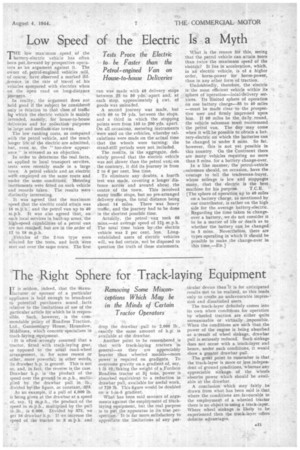Low Speed of the Electric Is a Myth
Page 23

If you've noticed an error in this article please click here to report it so we can fix it.
Tests Prove the Electric to be Faster than the Petrol engined Van on House-to-house Deliveries
THE low max:main speed of the battery-electric vehicle has often been put,forward by prospective operators as an argument against it. The owner of.. petrol-engined vehicles will, of course,' have observed a marked dif:ference in the rate of travel of his vehicles compared with electrics when on the open road on long-distance journeys. •
In reality, the argument does not hold good if the subject be considered only in relation to that class of traffic for which the electric vehicle is mainly intended, namely, for house-to-house deliveries and for collection purposes in large and medium-size towns.
The low running costs, as compared with the petrol vehicle, and the much longer life of the electric are admitted, but, even sp, the " too-slow appearance " is stressed as an objection.
In order to determine the real' facts, as applied to local transport servibes, tests were recently made in a large town. A petrol vehicle and an electric were employed on the same route and under the same conditions. Metering instruments were fitted on each vehicle and records taken, The results were distinctly interesting.
. It was agreed that the maximum speed that the electric could attain was 18 m.p.h.', and the petrol van up to 40 m.p.h. It was also agreed that, on such local services in built-up areas, the high-speed capabilities of a petrol van are not reached, but are in the order of 12 to 18 m.p.h.
,Vehicles of the 2-ton type were selected for the tests, and both were sent out over the sawe route. The 'first run was made with 48 delivery stops between 25 to 50 yds. apart and, at each stop. approximately 1 cwt. of goods was unloaded.
A second journey was made, but with 60 to 70 yds. between the stops, and a third in which the stopping points were from 150 to 200 yds. apart. On all occasions, metering instruments were used on the vehicles, whereby calculations were made on the actual time that the wheels were turning; the stand-still periods were not included.
The results, in the aggregate, definitely proved that the electric vehicle was not slower than the petrol van; on the contrary, it did its journey in from 2 to 6 per cent, less time.
To eliminate any doubts, a fourth test was made, covering a longer distance across and around about the centre , of the town. This involved many traffic stops, but no pre-arranged delivery stops, the total distance being about 14 miles. There was heavy traffic, and the journey had to be done in the shortest possible time.
Acta-ally, the petrol van took 66 mins.---an average speed of 121 m.p.h. The total time taken by the electric vehicle was 2 per cent, less. Longestablished users of electric vehicles will, we feel certain, not be disposed to question the truth of these statements.
What is the reason for this, seeing that the petrol vehicle can attain More than twice the maximum speed of the electric? It lies in acceleration, which, in an electric vehicle, is of a higher order, horse-power for horse-power, than in any other form of traction.
Undoubtedly, therefore, the electric is the most efficient vehicle within its sphere of operation—local-delivery services. Its limited sphere of operation on one battery charge-35 to 40 miles —must be made clear to the prospective user and firmly impressed upon him. If 60 miles be the daily round, the vehicle salesman must recommend the petrol van. The day may come when it will be possible to obtain a battery-electric on which the batteries can be changed in under 5 mins. So far, however, this is not yet possible in this country. On the Continent there are many vehicles requiring no more than 3 mins. for a battery change-over.
In a like manner, the petrol-vehicle -salesman should, on occasion, have the courage to tell the tradesman-buyer, whose mileage is low and stoppages many, that the electric is the best machine for his purpose. T.C.E. [The sphere of operation up to 40 miles on a battery charge, as mentioned by, our contributor, is rather on the high side for the average battery-electric. Regarding the time taken to changeover a battery, we do not consider it to be a matter of life or death as to whether the battery can be changed in 5 mins. Nevertheless, there are types operating in which it should be possible to make the change-over in this time.—En.]




















































